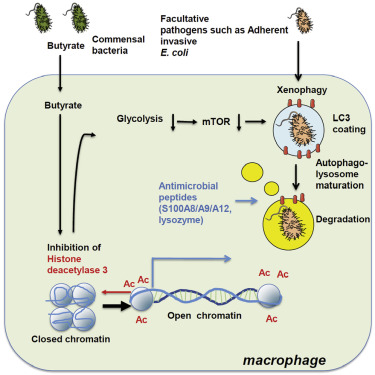Our official English website, www.x-mol.net, welcomes your feedback! (Note: you will need to create a separate account there.)
The Short Chain Fatty Acid Butyrate Imprints an Antimicrobial Program in Macrophages.
Immunity ( IF 32.4 ) Pub Date : 2019-01-23 , DOI: 10.1016/j.immuni.2018.12.018 Julie Schulthess 1 , Sumeet Pandey 2 , Melania Capitani 2 , Kevin C Rue-Albrecht 3 , Isabelle Arnold 2 , Fanny Franchini 3 , Agnieszka Chomka 3 , Nicholas E Ilott 3 , Daniel G W Johnston 3 , Elisabete Pires 4 , James McCullagh 4 , Stephen N Sansom 3 , Carolina V Arancibia-Cárcamo 2 , Holm H Uhlig 5 , Fiona Powrie 1
Immunity ( IF 32.4 ) Pub Date : 2019-01-23 , DOI: 10.1016/j.immuni.2018.12.018 Julie Schulthess 1 , Sumeet Pandey 2 , Melania Capitani 2 , Kevin C Rue-Albrecht 3 , Isabelle Arnold 2 , Fanny Franchini 3 , Agnieszka Chomka 3 , Nicholas E Ilott 3 , Daniel G W Johnston 3 , Elisabete Pires 4 , James McCullagh 4 , Stephen N Sansom 3 , Carolina V Arancibia-Cárcamo 2 , Holm H Uhlig 5 , Fiona Powrie 1
Affiliation

|
Host microbial cross-talk is essential to maintain intestinal homeostasis. However, maladaptation of this response through microbial dysbiosis or defective host defense toward invasive intestinal bacteria can result in chronic inflammation. We have shown that macrophages differentiated in the presence of the bacterial metabolite butyrate display enhanced antimicrobial activity. Butyrate-induced antimicrobial activity was associated with a shift in macrophage metabolism, a reduction in mTOR kinase activity, increased LC3-associated host defense and anti-microbial peptide production in the absence of an increased inflammatory cytokine response. Butyrate drove this monocyte to macrophage differentiation program through histone deacetylase 3 (HDAC3) inhibition. Administration of butyrate induced antimicrobial activity in intestinal macrophages in vivo and increased resistance to enteropathogens. Our data suggest that (1) increased intestinal butyrate might represent a strategy to bolster host defense without tissue damaging inflammation and (2) that pharmacological HDAC3 inhibition might drive selective macrophage functions toward antimicrobial host defense.
中文翻译:

短链脂肪酸丁酸酯在巨噬细胞中具有抗菌程序。
宿主微生物串扰对维持肠道稳态至关重要。但是,由于微生物的营养不良或宿主对侵袭性肠道细菌的防御能力不足,这种反应的适应不良会导致慢性炎症。我们已经表明,在细菌代谢产物丁酸酯的存在下分化的巨噬细胞显示出增强的抗微生物活性。丁酸盐诱导的抗微生物活性与巨噬细胞代谢的改变,mTOR激酶活性的降低,与LC3相关的宿主防御能力的增强以及在不增加炎症细胞因子反应的情况下产生抗微生物肽有关。丁酸通过组蛋白脱乙酰基酶3(HDAC3)抑制作用使单核细胞进入巨噬细胞分化程序。丁酸盐的施用在体内在肠巨噬细胞中诱导了抗微生物活性,并且增加了对肠病原体的抗性。我们的数据表明(1)肠丁酸盐增加可能是在不损害组织炎症的前提下增强宿主防御的策略,以及(2)药理学HDAC3抑制作用可能会促使选择性巨噬细胞功能朝着抗菌宿主防御的方向发展。
更新日期:2019-01-23
中文翻译:

短链脂肪酸丁酸酯在巨噬细胞中具有抗菌程序。
宿主微生物串扰对维持肠道稳态至关重要。但是,由于微生物的营养不良或宿主对侵袭性肠道细菌的防御能力不足,这种反应的适应不良会导致慢性炎症。我们已经表明,在细菌代谢产物丁酸酯的存在下分化的巨噬细胞显示出增强的抗微生物活性。丁酸盐诱导的抗微生物活性与巨噬细胞代谢的改变,mTOR激酶活性的降低,与LC3相关的宿主防御能力的增强以及在不增加炎症细胞因子反应的情况下产生抗微生物肽有关。丁酸通过组蛋白脱乙酰基酶3(HDAC3)抑制作用使单核细胞进入巨噬细胞分化程序。丁酸盐的施用在体内在肠巨噬细胞中诱导了抗微生物活性,并且增加了对肠病原体的抗性。我们的数据表明(1)肠丁酸盐增加可能是在不损害组织炎症的前提下增强宿主防御的策略,以及(2)药理学HDAC3抑制作用可能会促使选择性巨噬细胞功能朝着抗菌宿主防御的方向发展。



























 京公网安备 11010802027423号
京公网安备 11010802027423号